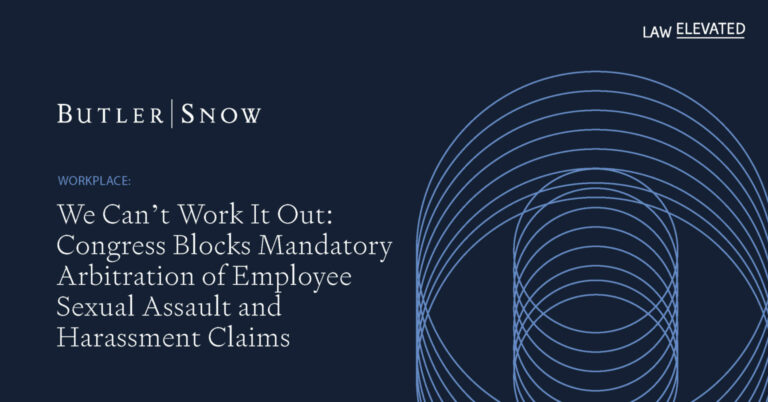With support on both sides of the aisle, Congress recently passed H.R. 4445, the Ending Forced Arbitration of Sexual Assault and Sexual Harassment Act of 2021. This legislation affects employment contracts that include pre-dispute arbitration agreements. Such agreements require employees to agree—before the existence of a dispute—to engage in arbitration rather than file a lawsuit if a dispute ultimately arises. The law went into effect on March 3, 2022 after it was signed by the President. Accordingly, all employers should familiarize themselves with the law’s key provisions and consider how they affect corporate sexual harassment and sexual assault policies.
H.R. 4445 amends the Federal Arbitration Act, codified at Title 9 of the United States Code. Under the Federal Arbitration Act, pre-dispute arbitration agreements are generally valid and enforceable. However, the new law creates an exception specifically for sexual harassment and sexual assault disputes. Under H.R. 4445, an employee alleging a sexual harassment or sexual assault dispute cannot waive their right to file suit against the employer before a dispute arises. In addition, H.R. 4445 also invalidates agreements that waive an employee’s right to bring claims through a class-action lawsuit. Therefore, pre-dispute arbitration agreements that prohibit an employee from filing a lawsuit, either individually or as a class action, based on alleged sexual harassment or assault are now unenforceable.
Whether a dispute qualifies as a “sexual harassment dispute” or a “sexual assault dispute” is a question of federal law under the definitions in H.R. 4445. Further, a court, rather than an arbitrator, must decide whether the law applies to a particular arbitration agreement. These mandates leave little wiggle-room for employers to compel arbitration in disputes where nonconsensual sexual acts or contact is alleged.
Although an employer can no longer compel an employee to agree to arbitrate before a dispute arises, the parties may still agree to arbitration after a dispute arises. Additionally, the law does not apply to other types of disputes; an employer may still enforce a pre-dispute arbitration agreement for other types of employment claims not involving allegations of sexual assault or harassment.
Importantly, H.R. 4445 will apply to existing arbitration agreements in addition to future contracts. Thus, employers with mandatory pre-dispute arbitration agreements currently in place should be prepared for such agreements to lose their effect in a dispute regarding alleged sexual harassment or assault.
Bottom line
Based on this new law, employers can no longer count on keeping sexual harassment or assault claims out of public forums or away from unpredictable jury outcomes. In addition, even in matters where they ultimately prevail, employers may face a more protracted and costlier defense in litigated matters, whereas the arbitration process is often more efficient. For these reasons, it will be more important than ever for employers to enact preventative measures, including adopting comprehensive anti-harassment policies, reporting and investigation protocols, and workplace training, to hopefully avoid claims and disputes of this nature. Employers with questions about compliance should contact an experienced employment law attorney for further consultation.
